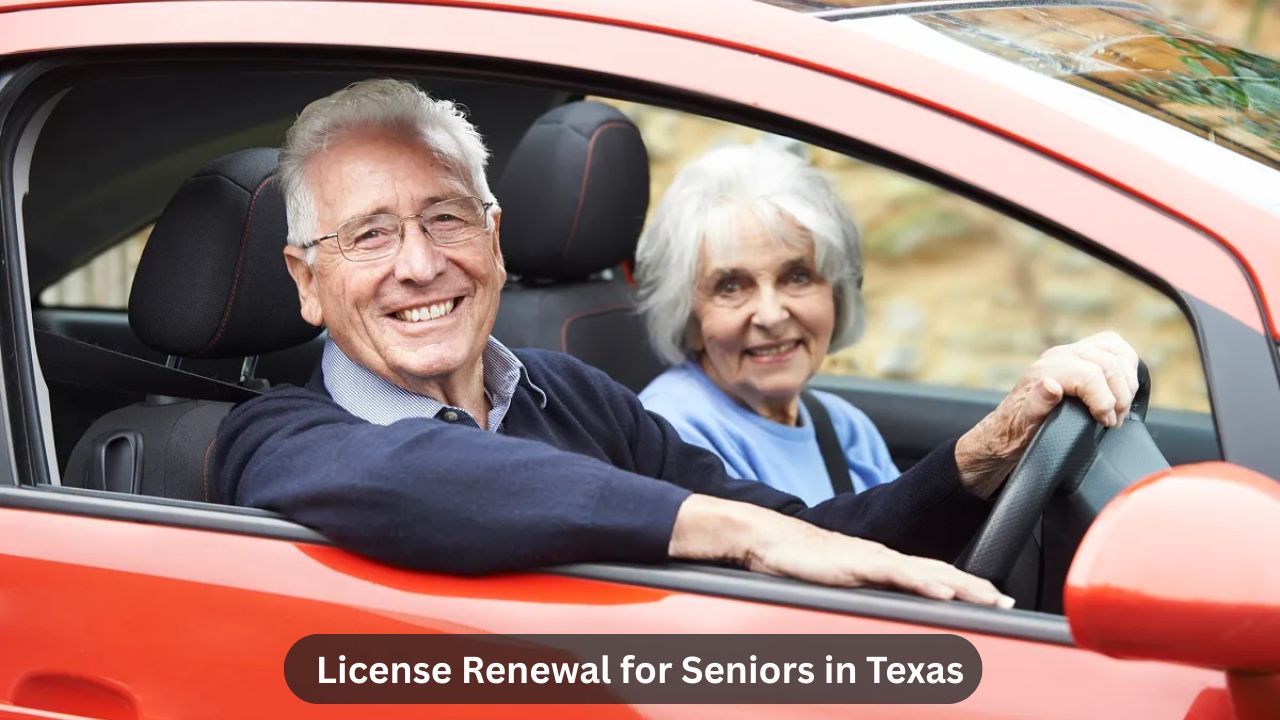As the calendar turns to 2025, senior drivers in Texas, particularly those residing in vibrant cities like Houston, Dallas, Austin, San Antonio, and El Paso, need to be aware of the specific procedures and requirements for renewing their driver’s licenses. Maintaining the ability to drive is crucial for independence, enabling seniors to access healthcare, social activities, and essential services. This comprehensive guide will walk you through the intricacies of the Texas driver’s license renewal process for individuals aged 79 and older in 2025, providing essential information, statistics, step-by-step instructions, and valuable tips to ensure a smooth and hassle-free experience.
Understanding the Texas Driver’s License Renewal Landscape for Seniors
In Texas, the Texas Department of Public Safety (DPS) oversees the issuance and renewal of driver’s licenses. Recognizing the unique needs of older drivers, the state has specific regulations in place for individuals aged 79 and above. These regulations aim to ensure continued driving competency while respecting the independence and mobility of senior citizens.
A. Key Age Threshold: The Significance of 79
The age of 79 is a significant marker in the Texas driver’s license renewal process. Once a driver reaches this age, the renewal requirements differ from those for younger individuals. This difference primarily involves the necessity of an in-person renewal and a vision test.
B. Why the Specific Requirements for Seniors?
The specific requirements for senior drivers are implemented to address potential age-related changes in vision, reflexes, and cognitive abilities that can impact driving safety. By requiring in-person renewals and vision screenings, the DPS aims to ensure that older drivers continue to meet the minimum standards for safe operation of a motor vehicle.
C. Statistics and Facts: The Senior Driving Population in Texas
Texas boasts a significant and growing senior population. According to the U.S. Census Bureau data from 2024 estimates:
- Approximately 12-13% of the Texas population is aged 65 and over, representing millions of individuals.
- A substantial portion of this demographic, particularly those between 79 and 90+, actively holds driver’s licenses.
- Studies have shown that while older drivers generally have lower crash rates per mile driven compared to younger drivers (primarily due to driving fewer miles), they are statistically more likely to be involved in crashes at intersections and during turns, often due to vision or cognitive impairments.
- The Texas DPS processes hundreds of thousands of driver’s license renewals for senior citizens annually across its numerous offices in cities like Lubbock, Amarillo, Corpus Christi, and Beaumont.
These statistics underscore the importance of a clear and accessible renewal process tailored to the needs of senior drivers in Texas.
The 2025 Renewal Requirements for Texas Drivers Aged 79 and Older
For Texas drivers aged 79 and older in 2025, the license renewal process mandates an in-person visit to a Texas DPS office. Online or mail-in renewals are not permitted for this age group.
A. Mandatory In-Person Renewal:
The requirement for an in-person renewal allows DPS personnel to conduct necessary evaluations, including a vision test, and address any specific concerns related to the applicant’s driving ability. This face-to-face interaction is a crucial component of ensuring continued safe driving practices.
B. Vision Test:
A mandatory vision test is administered at the DPS office during the renewal process. This test assesses visual acuity, peripheral vision, and the ability to distinguish colors, all of which are critical for safe driving.
- Minimum Vision Standards: To pass the vision test, you generally need to have at least 20/40 vision in at least one eye, with or without corrective lenses, and a field of vision of at least 70 degrees.
- Corrective Lenses: If you require glasses or contact lenses to meet the minimum vision standards, your driver’s license will likely include a restriction indicating this requirement.
- Failure of the Vision Test: If you fail the initial vision test, you may be given the opportunity to take it again. If you fail a second time, the DPS may require you to obtain a vision examination from a licensed ophthalmologist or optometrist. The eye doctor will complete a Vision Examination Report (DL-64), which you will need to submit to the DPS. Based on the doctor’s recommendations, your license may be renewed with certain restrictions or denied.
C. Providing Required Documentation:
When visiting the DPS office for your renewal, you will need to present specific documentation to verify your identity, Texas residency, and U.S. citizenship or lawful presence. Ensure you have the following documents readily available:
- Proof of Identity: A valid U.S. passport, original or certified copy of a birth certificate, Texas Identification Card, or other acceptable forms of identification.
- Proof of Texas Residency (two documents): Examples include a current utility bill (water, gas, electricity), bank statement, insurance policy, property tax statement, or a lease agreement. Ensure these documents display your current Texas address. If you’ve recently moved to cities like Plano, Garland, or Irving, ensure your residency documents reflect your new address.
- Proof of U.S. Citizenship or Lawful Presence: If you were not born in the U.S., you will need to provide documentation such as a valid Permanent Resident Card, Employment Authorization Document, or other acceptable immigration documents.
- Your Current Texas Driver’s License: Bring your expiring or recently expired Texas driver’s license.
- Social Security Card (if you have one): While not always mandatory to present, having your Social Security card can help expedite the process.
D. Potential Knowledge or Driving Tests (Case-by-Case Basis):
While a standard knowledge or driving test is not typically required for senior license renewal solely based on age in Texas, the DPS examiner may request one if there are concerns about your driving abilities observed during the in-person interaction or based on your driving record. This is usually on a case-by-case basis.
E. License Restrictions:
Based on the vision test or any other medical conditions you may have, your renewed driver’s license may include certain restrictions. Common restrictions for senior drivers include:
- Corrective Lenses Required: Stipulates that you must wear glasses or contact lenses while driving.
- Daylight Driving Only: Restricts driving to daylight hours.
- Outside Mirror Required: Mandates the use of an outside rearview mirror on the driver’s side.
- Other Restrictions: May be added based on specific medical conditions or recommendations from healthcare professionals.
Step-by-Step Guide to Renewing Your Texas Driver’s License (Age 79+) in 2025
Navigating the renewal process can be straightforward if you are well-prepared. Here’s a step-by-step guide:
Step 1: Gather Required Documents:
Well in advance of your license expiration date, collect all the necessary documents as outlined in Section II.C. Ensure that your proof of Texas residency is current and reflects your correct address, whether you reside in a large metropolitan area like Fort Worth or a smaller city like Waco.
Step 2: Schedule an Appointment (Recommended):
While walk-ins are generally accepted at Texas DPS offices, scheduling an appointment online can significantly reduce your waiting time. Visit the Texas DPS website to check appointment availability at your preferred location in cities such as Killeen, Bryan, or College Station.
Step 3: Visit Your Local Texas DPS Office:
On your scheduled appointment date and time (or when you choose to walk in), go to your local Texas DPS office. Be prepared for potential wait times, even with an appointment.
Step 4: Complete the Application Form:
Upon arrival, you will likely need to complete a driver’s license application form. You can often find this form online on the DPS website and fill it out beforehand to save time.
Step 5: Undergo the Vision Test:
A DPS employee will administer the vision test. Ensure you are wearing any necessary corrective lenses. If you fail, follow the instructions provided by the DPS, which may involve a retest or a referral to an eye doctor.
Step 6: Provide Your Documentation:
Present all the required documents to the DPS representative for verification.
Step 7: Have Your Photo Taken:
A new photograph will be taken for your updated driver’s license.
Step 8: Pay the Renewal Fee:
There is a fee associated with driver’s license renewal. The current fee (as of late 2024 and expected for 2025) is typically around $33. Be prepared to pay this fee via accepted methods, which usually include cash, check, and major credit/debit cards. Fees are subject to change, so it’s always a good idea to verify the current fee on the Texas DPS website.
Step 9: Receive Your Temporary License:
After completing all the steps and paying the fee, you will typically receive a temporary paper driver’s license. Your permanent driver’s license will be mailed to your Texas address within a few weeks.
Step 10: Review Your New License:
Once you receive your permanent license, carefully review all the information, including your name, address, date of birth, and any restrictions. If you find any errors, contact the Texas DPS immediately to have them corrected.
Tips for a Smooth Renewal Experience
To make your driver’s license renewal process as smooth and stress-free as possible, consider the following tips:
- Renew Early: Don’t wait until the last minute to renew your license. You can typically renew your license up to two years before its expiration date. This provides ample time to address any potential issues.
- Check Your Expiration Date: Keep track of your driver’s license expiration date to avoid driving with an expired license, which can result in fines and legal complications in cities like Midland or Odessa.
- Ensure Correct Address: Verify that the address on your current driver’s license is correct. If you have recently moved, update your address with the DPS before your renewal appointment.
- Bring All Required Documents: Double-check that you have all the necessary documents before heading to the DPS office. Missing documents can lead to delays and the need for a return visit.
- Schedule an Appointment: As mentioned earlier, scheduling an appointment can save you significant time.
- Be Prepared for the Vision Test: If you wear glasses or contact lenses, bring them to your appointment. If you have any concerns about your vision, consider having an eye exam before your renewal.
- Be Patient and Courteous: DPS offices can sometimes be busy. Be patient and treat the staff with courtesy.
- Inquire About Resources for Senior Drivers: The Texas DPS website and local senior centers in cities like Tyler or Longview may offer additional resources and information specifically for senior drivers.
Addressing Potential Challenges and Concerns
Senior drivers may encounter specific challenges during the license renewal process. Being aware of these potential issues and how to address them can be helpful.
A. Vision Impairment:
If you have significant vision problems, failing the DPS vision test can be a concern. As mentioned earlier, you will likely be required to see an eye doctor. Following their recommendations and any restrictions placed on your license is crucial for your safety and the safety of others.
B. Medical Conditions:
Certain medical conditions can affect driving ability. Texas law requires drivers to report any medical condition that could impair their ability to safely operate a motor vehicle. The DPS may require a medical evaluation from your physician. Be prepared to provide any necessary medical documentation.
C. Cognitive Decline:
While the standard renewal process for seniors in Texas primarily focuses on vision, DPS personnel may observe signs of cognitive impairment during the in-person interaction. In such cases, they may request additional evaluation or testing.
D. Transportation Alternatives:
If, for any reason, you are unable to renew your driver’s license or choose not to drive, it’s essential to explore transportation alternatives available in your community. Many cities in Texas, including major centers like Austin and smaller towns, offer senior transportation services, public transit options, and ride-sharing services.
The Importance of Safe Driving Practices for Seniors
Maintaining safe driving practices is paramount for all drivers, but it takes on added significance for seniors who may experience age-related changes.
- Regular Vision Check-ups: Schedule regular eye exams with an ophthalmologist or optometrist to monitor your vision and address any changes promptly.
- Medication Awareness: Be aware of the potential side effects of any medications you are taking that could affect your driving ability. Discuss this with your doctor.
- Physical Fitness: Maintaining a good level of physical fitness can help with reaction time, flexibility, and overall driving ability.
- Driving Adjustments: Be mindful of changes in your reflexes and adjust your driving habits accordingly. This might include driving during daylight hours, avoiding rush hour traffic in busy cities like Dallas or Houston, and taking extra caution at intersections.
- Consider Refresher Courses: Many organizations offer driving refresher courses specifically designed for seniors. These courses can help update your knowledge of traffic laws and safe driving techniques.
Conclusion: Empowering Senior Drivers in Texas to Stay Mobile Safely
Renewing a driver’s license as a senior in Texas in 2025 requires an in-person visit to a DPS office, a vision test, and the provision of necessary documentation. By understanding the requirements, preparing thoroughly, and following the steps outlined in this guide, senior drivers in cities across the Lone Star State can navigate the renewal process with confidence and ease. Maintaining driving independence is vital for many seniors, and the Texas DPS aims to ensure this while prioritizing the safety of all road users. By staying informed and proactive, senior drivers can continue to enjoy the freedom and mobility that driving provides for years to come. Remember to prioritize safety and adapt your driving habits as needed to ensure a comfortable and secure driving experience in 2025 and beyond.
For more information and to schedule an appointment, visit the Texas Department of Public Safety website.















Leave a Reply